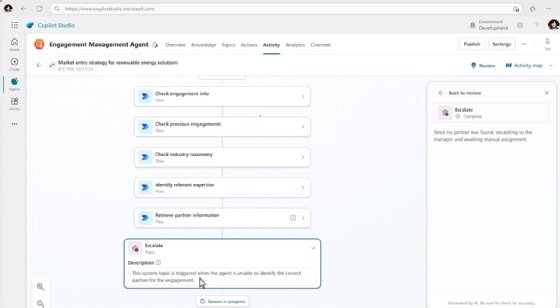sdecoret - stock.adobe.com
Microsoft adds Copilot agents, design tools for 365, Dynamics
Microsoft hopes the new tools will be enough to convince enterprises to move beyond testing and fully adopt Copilot.
The next generation of Microsoft Copilot is here. Users -- the majority still in the pilot stage -- get a Copilot design tool and generative AI agents tuned to Microsoft 365 productivity tools, Dynamics CRM and ERP.
In its public preview of Microsoft Copilot Studio and 10 prebuilt agents, the company revealed more of its strategy to make Teams the place where office workers get things done, said Gartner analyst Jason Wong. Giving users a means to develop their own custom agents is an important evolution of previous tools such as Power Automate.
Copilot Studio, a conversational AI platform that allows users to create customized agents, will be a critical product for Microsoft in 2025, Wong said. It reaches content and data sources beyond Microsoft's customary SharePoint and OneDrive repositories.
"Increasingly, what we're seeing is that Microsoft 365 Copilot by itself is often not enough to really transform work," he said. "Work involves data and workflow not just in office applications, not just in Teams, not just in email -- it's knowledge in other systems. It's not going to be worth moving that knowledge into SharePoint."
Microsoft hopes the new tools will promote Copilot adoption that has yet to materialize. Gartner research shows that 20% of survey respondents have some Copilot features in production, but more than half of those are small-scale, rolled out to one-fifth of employees or fewer. Sixty percent of respondents reported they have Copilot pilot projects in progress but haven't rolled it out.
The remaining 20% haven't yet started pilots. Some of those who haven't rolled agents into production are still in research mode, assessing how generative AI will work in their IT environments. Others report budget concerns.
Bryan Goode, Microsoft corporate vice president, said he believes agents will be the next evolution of the business app. Many customers still use Power Automate and Power Apps to create their own apps and workflows without AI, but in the long term, generative AI will likely replace those apps.
"I feel great about the adoption that we're seeing," Goode said. "I do think that customers are eager to customize Copilot to their unique needs and apply it to individual business processes -- and that's where Copilot Studio comes in."
Goode said 50,000 organizations have tried Copilot Studio.

Everybody's doing it
Autonomous agents, empowered to perform actions and not just provide information summaries, are a competitive market in the CX space. Zendesk, Oracle and Salesforce also released autonomous agents powered by GenAI, accompanied with no-code design tools so developers aren't needed to create them. ServiceNow and Google also enable AI agent building.
Along with the Copilot Studio design tool comes 10 generative AI agents for sales, operations, service, supply chain and finance, scheduled for public preview between now and early 2025. Customer service gets special emphasis with four of the 10, including field service, because that is emerging as the most natural match for generative AI to improve processes, Goode said.
Interestingly, Microsoft's autonomous agents can reach into data sources outside Microsoft apps, just as Salesforce's Agentforce agents, built in Slack, can reach into data sources outside Salesforce. It sets up a heated competition for the heart of IT leadership and developers.
Wong said it's way too early to know how the competition will shake out, but it's probable that Salesforce customers will likely stick to Salesforce's agent-building tools if their organizations are plugged into Data Cloud and Slack. It could be reminiscent of how low-code app builders were rolled out; everyone has it, from Salesforce to ServiceNow to Microsoft to Adobe. Further muddying the waters is how Teams and Slack can host apps from Microsoft and Salesforce and Adobe and many other business apps.
"It's way too early to say there's a single entry point," Wong said. "Microsoft would want that to be the business chat experience in Teams, with Copilot on the left hand side of the panel, not the right hand side. That, to them, is the hero experience. You start your day in that because it's connected into your entire office estate."
Copilot Studio costs $300 per month for 25,000 agent messages. Copilot itself is $30 per user, per month with an annual commitment.
Don Fluckinger is a senior news writer for TechTarget Editorial. He covers customer experience, digital experience management and end-user computing. Got a tip? Email him.








